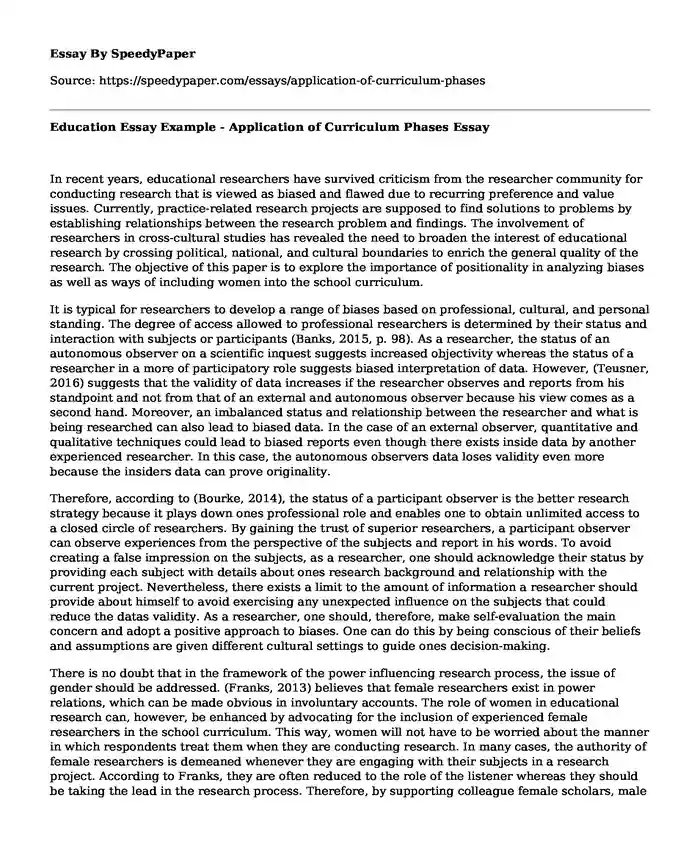In recent years, educational researchers have survived criticism from the researcher community for conducting research that is viewed as biased and flawed due to recurring preference and value issues. Currently, practice-related research projects are supposed to find solutions to problems by establishing relationships between the research problem and findings. The involvement of researchers in cross-cultural studies has revealed the need to broaden the interest of educational research by crossing political, national, and cultural boundaries to enrich the general quality of the research. The objective of this paper is to explore the importance of positionality in analyzing biases as well as ways of including women into the school curriculum.
It is typical for researchers to develop a range of biases based on professional, cultural, and personal standing. The degree of access allowed to professional researchers is determined by their status and interaction with subjects or participants (Banks, 2015, p. 98). As a researcher, the status of an autonomous observer on a scientific inquest suggests increased objectivity whereas the status of a researcher in a more of participatory role suggests biased interpretation of data. However, (Teusner, 2016) suggests that the validity of data increases if the researcher observes and reports from his standpoint and not from that of an external and autonomous observer because his view comes as a second hand. Moreover, an imbalanced status and relationship between the researcher and what is being researched can also lead to biased data. In the case of an external observer, quantitative and qualitative techniques could lead to biased reports even though there exists inside data by another experienced researcher. In this case, the autonomous observers data loses validity even more because the insiders data can prove originality.
Therefore, according to (Bourke, 2014), the status of a participant observer is the better research strategy because it plays down ones professional role and enables one to obtain unlimited access to a closed circle of researchers. By gaining the trust of superior researchers, a participant observer can observe experiences from the perspective of the subjects and report in his words. To avoid creating a false impression on the subjects, as a researcher, one should acknowledge their status by providing each subject with details about ones research background and relationship with the current project. Nevertheless, there exists a limit to the amount of information a researcher should provide about himself to avoid exercising any unexpected influence on the subjects that could reduce the datas validity. As a researcher, one should, therefore, make self-evaluation the main concern and adopt a positive approach to biases. One can do this by being conscious of their beliefs and assumptions are given different cultural settings to guide ones decision-making.
There is no doubt that in the framework of the power influencing research process, the issue of gender should be addressed. (Franks, 2013) believes that female researchers exist in power relations, which can be made obvious in involuntary accounts. The role of women in educational research can, however, be enhanced by advocating for the inclusion of experienced female researchers in the school curriculum. This way, women will not have to be worried about the manner in which respondents treat them when they are conducting research. In many cases, the authority of female researchers is demeaned whenever they are engaging with their subjects in a research project. According to Franks, they are often reduced to the role of the listener whereas they should be taking the lead in the research process. Therefore, by supporting colleague female scholars, male researchers could help stem the authority of female researchers. Also, the experience of women can be incorporated into the school curriculum by promoting research on matters that are female related. Also, this kind of specialization could reduce the negative attitude women receive from their respondents because they would be engaging individuals in the same gender. Moreover, women would get an equal chance to conduct contributive research.
Apart from incorporating scholarly and experienced women in educational research studies, schools should integrate courses on womens gender and sexuality in their curriculum to promote the role of women today. Useful courses such as feminist theories and perspectives could be introduced to deepen the understanding of students on how feminist perceptions assign power and privilege in relationship to related categories of race, class, nationality, and ability (Banks, 2015, p. 117). This course can be emphasized using contemporary courses such as the history of American feminism, which focuses on nineteenth-century womens movements such as the suffrage movement and their response to patriarchy and other forms of oppression. Using theoretical tests, such courses could help in expanding the students understanding of significant theoretical contexts that inform womens sexuality studies and debates surrounding them. Also, students could develop intellectually with the understanding that women do not present weaker perceptions as compared to men.
The aim of educational research should not be a synthetic version but a process through which a researcher demonstrates intellectual and technical prowess by democratic principles. Also, the school curriculum should promote gender equality as much as it encourages education for the girl child.
Reference
Banks, J. A. (2015). Cultural diversity and education. Routledge.
Cite this page
Education Essay Example - Application of Curriculum Phases. (2019, Oct 01). Retrieved from https://speedypaper.net/essays/application-of-curriculum-phases
Request Removal
If you are the original author of this essay and no longer wish to have it published on the SpeedyPaper website, please click below to request its removal:
- Academic Essay Example about Dishonesty
- Research Design Methodology Used in Carrying Out the Study of Airbnb. Free Essay.
- Essay Sample: Advantages and Disadvantages of the Electoral College
- Essay Sample with Petitioning for College Credits
- Smart Technologies - Free Essay for Your Inspiration
- Case Study Paper Sample: Relationship Between Technology and Productivity
- Essay Example on Climate Change Problems in the Coral Reefs
Popular categories





